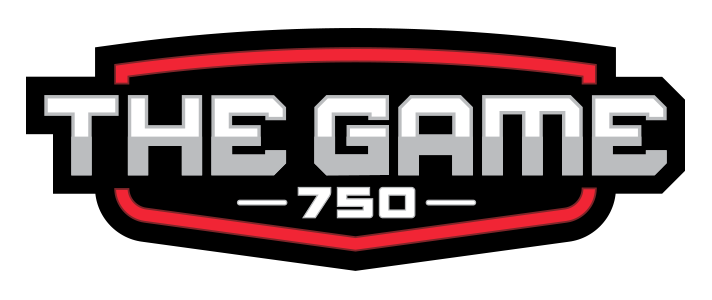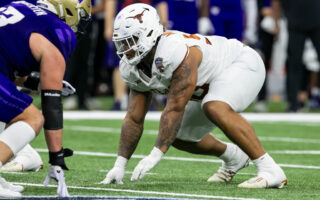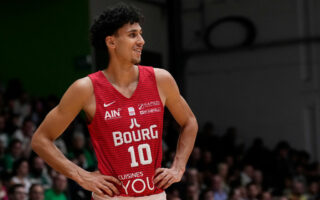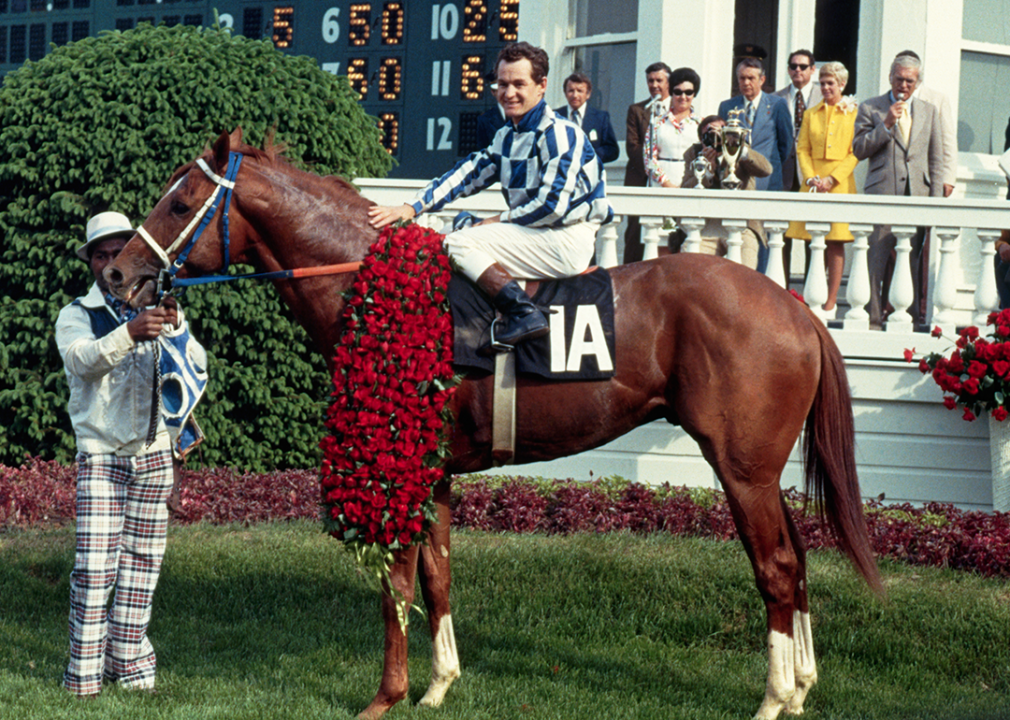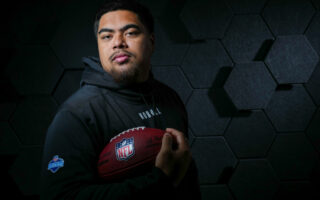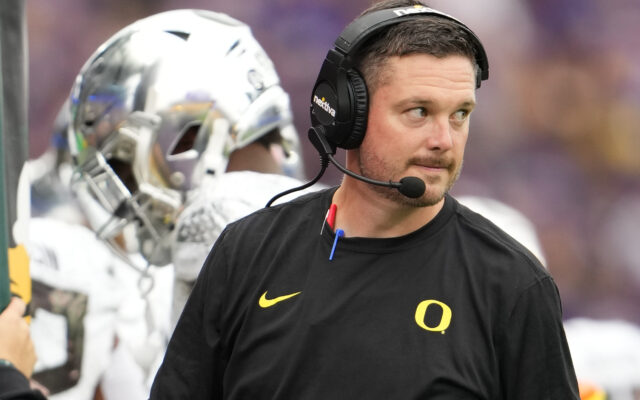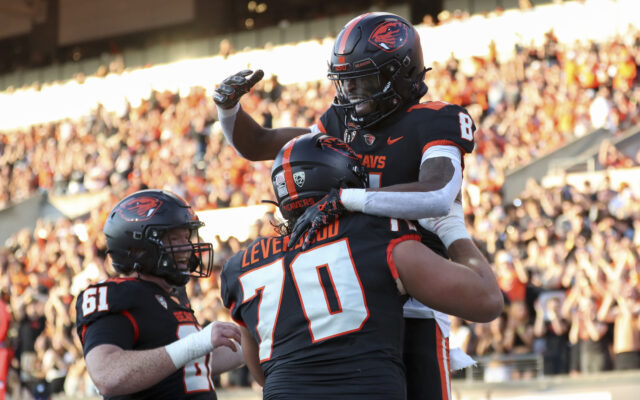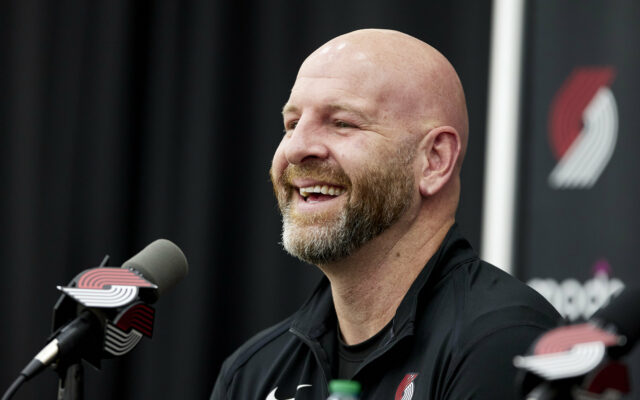A Conversation With Former Oregon State Ace Ben Ferrer
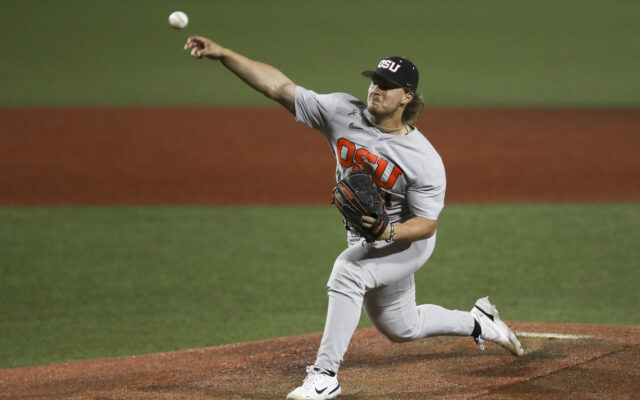
By Peter Baker, Guest Writer
Alpharetta, Georgia is a short thirty-minute drive north on Route 19 from Atlanta, and it is 2,182 air miles from Corvallis, Oregon. It is also home to Ben Ferrer, an Oregon State pitcher for two seasons, 2022 and 2023.
He is the eldest of three sons, and though born and raised in Georgia, he is not possessed of the southern accent I expected when we spoke last week. “I was born there,” Ferrer says, “but both my parents are from the Midwest, so we don’t have that true southern slang and accent.”
The picture of him in his OSU roster bio portrays a clean-shaven kid with a gentle smile. Watch him on the mound, though. He looks primal. Like a wolf right before the kill. It struck me as a contrast almost to the extreme; it’s the reason I wanted to speak with him. I asked the inevitable question: How had he and the Beavers found each other?
Ferrer’s baseball story began on the playgrounds and ball fields of Alpharetta. “I started playing when I was three — playing T-Ball.” He laughs softly at the memory. “When you’re little, you’re just playing for the love of the game.” As he grew, Ben continued playing and his game continued improving. “I was always on the all-star team, always one of the better players on every team,” he says.
“Once I got to high school in my freshman year, I really started to look beyond — playing in college and professionally,” Ben remembers. He hadn’t found his way to the pitcher’s mound yet though. “Growing up, I was more of a hitter, I didn’t start taking pitching seriously until junior year of high school. Up to that point I wanted to be a hitter in college.” As a Georgia boy, Ferrer was a Braves fan. “I grew up watching Chipper Jones, but I’d say my favorite player growing up was Derek Jeter because I played (in the) infield too.”
Ferrer fully shifted his efforts to pitching as a high school senior, and his collegiate career began in Spartanburg, South Carolina at the University of South Carolina – Upstate, a Division 1 university in the Big South Conference. He majored in Business Administration and pitched for the Spartans for three seasons from 2019 through 2021.
He pitched 30 1/3 innings in 15 games in his freshman year striking out 20, issuing 14 walks while recording a 4.75 earned run average. The following season, he pitched in only two games. In 12 1/3 innings he recorded 20 strikeouts, walking only 3 and posted a 1.46 ERA. Pitching in his final campaign as a Spartan, he worked 44 innings over 8 games, striking out 38 while allowing just 9 walks and a 4.09 ERA for the season.
In the Ferrer household, education is held in high regard, and college was the expectation for the three sons. Ben earned his undergraduate degree in only three years with a GPA of 4.0. But the University of South Carolina – Upstate didn’t offer the graduate program for which Ferrer was looking, and in that summer of 2021 Ferrer was seeking a place to continue his business studies while also looking for the next step up in college baseball.
He had two years of NCAA eligibility remaining. “Our coaches set me up in the West Coast League with the Bend Elks for a month,” Ben recalls. “I did it for the experience because I’d never been to that part of the country. My Elks coaches were both former Beavs — Kyle Nobach and Joey Wong. I think they liked what they saw and they told Mitch (Canham, Oregon State’s head coach).”
At the time, the collegiate transfer portal had only been in existence for two and a half years, and Ferrer had entered his name in the database. “There were a bunch of teams reaching out (to me).” Nobach and Wong are both Oregon State National Championship winners — Wong, with the 2007 CWS team and Nobach with the 2018 CWS winner. Nobach remembers that Ferrer was eager to compete at a higher level.
“He really wanted to pitch for a national college baseball power. When we saw his persona, his focus, we agreed ‘This guy is a Beav. We have to put in a call’. There is Ben in day-to-day life and then there is Ben on the mound,” Nobach said.
Nobach describes that when Ferrer was pitching there was an intensity. “It was almost as if he didn’t know who he was”, Nobach says. “All that mattered to him was the next pitch. But, that’s the embodiment of a true competitor.”
Wong put it differently – “He was ultra-competitive but in a controlled way. He knew how to harness it. He attacked the (strike) zone. But, it was also his measurables. Ben’s a big, strong guy with a big lower half which is important for pitchers.” Both coaches commented that Ferrer was also a great teammate. “Soft-spoken off the field, and an experienced leader on the field. And then we learned he was in the transfer portal. We made the call to Mitch,” says Wong.
Just three seasons removed from their most recent NCAA National Championship, the Beavers were looking for upper-tier talent to continue winning at the highest level. “Mitch came and saw me throw a game. He recruited me, offered me and I visited OSU in July. A week later I made my decision over some other programs, and I don’t regret it one bit,” Ferrer says.
In nine games with the Elks that summer, Ben pitched 16 1/3 innings during which he struck out 18 batters and walked only seven. He faced a total of 66 batters and surrendered only 8 total hits. His ERA was 2.76.
If Ferrer’s field performance was enough to get Canham’s attention, it was the right-hander’s approach that convinced OSU coaches to bring him to Corvallis. Wong said of Canham’s evaluation after seeing Ferrer pitch, “Mitch was impressed by Ben’s stuff, but also his mindset, his competitive mentality.”
Ben arrived on the OSU campus in the fall of 2021. He had been one of the older leaders at South Carolina – Upstate and had experience in that role. But he says there were doubts coming across the country. He knew almost nobody.
As Ferrer tells the story, “It was a brand new team to me and a brand new part of the country. I had those doubts- ‘Do I really belong here? Did I make the right choice?’” But the Beaver baseball program has a thoughtfully curated culture. “It makes everyone fit together. It took about a week, and then it felt like I’d known them all for years,” Ferrer recalls.
At Oregon State, Ben found the step up he’d been seeking. The PAC-12 conference is home to more NCAA baseball national championships than any other conference. The player preparation resources were unlike anything he had seen to that point, data analytics in particular.
Ferrer explains, “My previous school didn’t have anything like that, and it’s such a big part of today’s game. Our (OSU) analytics department helped us in breaking down hitting reports, and provided metrics after outings so we could see how our stuff was moving and playing that day. (OSU) had abundant analytics resources.”
The growing volume of available data can be overwhelming for some college players. One, with whom I recently spoke, compared it to a deep rabbit hole, saying that he had to actively manage his interaction with and intake of analytic data. Ferrer agreed. “There’s so much information out there in today’s game. There’s really a lot.”
Ben formed lasting bonds with his coaches. “I was really close with Rich Dorman, our pitching coach,” he says. “Our relationship really grew over the two years and I’m still really close to him. I try to talk to him every couple of weeks.” Of Mitch Canham he said, “I love Mitch. He’s a great leader; I’ve always respected him – his messages, (the way) he always provided for us. I learned a lot from him”.
The calendar for Oregon State baseball is in line with the university’s. “We have a fall season,” Ferrer said. NCAA rules allow baseball programs 45 days of officially sanctioned team activities in the fall. For the Beavers, this includes a slate of games against teams they might not ordinarily play during the regular season.
Known as Fall Ball, this mini season gives the new freshmen and transfer players a chance to play with the returning players. It’s the first live game experience each year’s group of players share together, and it gives the coaches the opportunity to evaluate new players in real-time.
Regularly scheduled team and individual work takes place as well. “We hit the weights hard, 6 a.m., 7 a.m.,” Ferrer says. “There are full practices during the week with a lot of intersquad work battling out with each other. Good competition brings out the best in everybody.” It’s a structure that supports Canham’s philosophy that the players decide the starting lineup.
As fall gives way to the holidays, the players are given time away to enjoy winter break with their friends and families before the next phase of off-season work begins. Ferrer explained, “Pitchers report early after Christmas. The report date for us to get back on campus was before the new year, and that’s really the ramp-up period to the season.”
This is the time of year when players are working hard in focused preparation for the season. “As pitchers, we’re throwing bullpens (with increasing pitch counts) and getting our arms ready,” Ben says. “By about the second or third week in January we’re inter-squading and scrimmaging. That’s really the time to build up and get the arm in shape for the season. The goal is upgrading and building pitch count.”
The players are also weight training during this time. They’ll lift about four times a week doing a full body workout. “The winter is the time to get stronger so you can maintain that strength throughout the season; once the season starts, our focus isn’t as much on weightlifting,” Ferrer says. “This period between the new year and the start of the season is the last full block to achieve ‘game strength’. After that, once the season begins, it’s more about maintaining strength and trying to keep the body healthy during the season.”
At Oregon State, Ben’s talents were mostly put to use in the late middle innings, and mos frequently he was the setup guy — the bridge — to closer Ryan Brown. The pair were formidable when the Beavers had a lead heading into the late innings.
“We were very similar — everyone always said we’re kind of built the same and look the same. We’re back-end bullpen guys and we were definitely close off the field as well. Ryan and I are (still) good buddies,” Ben says. His mission was simple, but rarely easy: get the Beavers off the field and back on offense.
At 6 feet and 210 pounds, he is nothing if not an imposing presence on the field. When called upon, he would walk to the mound in a straight line with a loose but purposeful gait, eyes front, the look on his face one of wicked determination. His demeanor on the field is commanding.
“When I’m out there, I definitely flip that switch. I’ve always been a high emotion guy. I like to lay it out there, and I’m not afraid to get fired up from time to time,” Ferrer says in an even tone. Most often, he emphatically bare-handed the game ball tossed to him by Rich Dorman and would throw his warm-up pitches before standing quietly in the green turf behind the mound for a moment gathering his thoughts.
“My pitches never changed in my time at OSU. Fastball, changeup, slider,” Ben tells me. “My pitch usage changed a lot though.” Ferrer is a student and practitioner of the slider. In his pursuit of throwing it in any situation, any pitch count, he focused on differing spin rates and other specifics.
“My slider usage increased heavily in my two years (at OSU). It was my best pitch, so I threw it more frequently which led to better results than I’d had previously,” Ferrer explains. “It was my most trusted pitch no matter who the batter was (left or right-handed). But really, I’m comfortable throwing any pitch to any batter no matter what the count is.”
In 2022, his first season with the Beavers, Ferrer pitched 62 ⅔ innings in 24 games coming out of the bullpen. Recording 4 wins, no losses and 3 saves predominantly in the set-up role, he struck out 78 batters while walking only 14 and notched a 1.72 ERA. He was named to the All PAC-12 First team as well as being named an All American by D1 Baseball and Baseball America.
Then, in the critical winter period of preparation for the 2023 season, Ferrer was stricken with a debilitating case of mononucleosis rendering him unable to properly get himself physically ready for the demands of the campaign. Ben came off the boil, posting a 4.80 ERA across 45 innings in 21 appearances. He won 2 games, lost two and saved two, striking out 53 and walking 11 along the way.
His time as a college baseball player ended in Baton Rouge where the Beavers couldn’t get past the Louisiana State University Tigers in the NCAA regional. It was not the ending Ferrer and the Beavers had been building toward.
In the first of Oregon State’s two games against the Tigers, Ferrer entered the game in the fourth inning with one out and a 3-2 lead. He closed out the inning and battled through the fifth and sixth innings giving up three runs, and by the end of the sixth, LSU had taken the lead 5-3. The Beavers tied the game in the seventh on a Gavin Turley two-run homer.
Ferrer says what happened next was a “…bad moment”. He recounts, “I started the (eighth) inning against (Brayden) Jobert with a 2-0 fastball. He hit a home run to take the lead.” The Tigers never relinquished it, and Ben took the loss. The next day he was called from the bullpen into the second game against LSU.
He entered the game with two outs in the fourth and surrendered a hit and a walk before striking out the last hitter to end the inning. It was the last batter he faced as a collegiate pitcher. The Beavers lost the game, ending their season. LSU went on to win the 2023 College World Series.
I asked Ben which of his teammates at OSU inspired him. “There’s so many guys that inspired me. We’re all so close,” Ferrer says. “My first year there, Mitchel Verberg took me under his wing being the oldest guy.” The two pitchers got along well and had a bond. “He inspired me with his hard work.” There were others as well. “Seeing what Cooper Hjerpe did every Friday night with his silent work ethic was always great.”
It wasn’t just the team’s veterans who had an impact on Ben. “Being an older guy, you can get inspired by younger guys (too) — seeing the talents of guys like Garret Forrester and Travis Bazzana — all of those guys. I think that’s what made us meld so well. I feel like everyone kind of feeds off each other and can take something from each other (whether) you’re batting second or not playing at all,” Ferrer reflected.
The 2023 Major League Baseball draft came and went last July without Ben hearing his name called, but he was contacted by the Glacier Range Riders of the Pioneer League in Kalispell, Montana. “Their manager just recruited me… reached out and made an offer,” Ben says.
The Pioneer League is an eight-team professional league that has no affiliation with MLB but is considered an MLB Partner League. Ben put up good numbers pitching 17 innings in 14 games with a 2.65 ERA. He won one game and lost one, while striking out 19 batters and walking three.
Ferrer was an actively engaged graduate student at Oregon State. In 2023, he was selected as an Academic All-American. “I graduated with my Master’s degree in Corporate Finance and Business Analytics,” Ferrer says.
“Although I haven’t given it too much thought yet, I’ll probably go into the world of finance, or analytics on the baseball side of things,” Ben says. “I will be trying to stay in the game and use my knowledge of money and finance to combine the two”.
Seven months removed from the expiration of his collegiate eligibility it is unclear whether Ben Ferrer will take the next step up in baseball. But this much is clear: he unflinchingly continues to work hard for the chance to compete. “I’m working with Driveline in Scottsdale preparing for upcoming opportunities,” he says.
Driveline is a baseball-specific private training company that utilizes highly detailed computer analysis and data to help players realize their potential and maximize their performance. “There’s a pro day coming up, and there are various workouts that (MLB) teams hold. They’re looking to sign players to fill spots where they have a need,” according to Ferrer.
Canham has said he strives to create an environment to which former players feel comfortable returning. I asked Ben if he’d thought about the possibility of returning to OSU as a coach someday. Said Ferrer, “I would definitely consider coming back. I loved my time at OSU and being in Corvallis. I love the culture there. If the opportunity presented itself in a couple years, I’d be open to that.”
When asked to reflect on his time at OSU, the soft-spoken southerner took his time to reply. “I’m most proud of what we were able to accomplish on and off the field as a team,” he said. “I’m proud that I did the best I could to represent myself and the program, and be someone (that) any young Beaver fan can look up to in the classroom and on the field.”
Ferrer put a finer point on it — “I like to think I went about it the right way and that my teammates and coaches would say the same. The relationships I (formed) will always stay with me… teammates, coaches, staff… I’m grateful for all of them. I have lifelong friends and relationships for sure.”
Mike Parker is the broadcast voice of Oregon State Baseball. Other than teammates and coaches, Parker is the one person who witnessed the full body of Ferrer’s work at OSU and had the opportunity to get to know him. “He’s a relentless competitor with great drive,” says Parker. “When he came into games, I always felt good about the Beavers’ chances of winning.”
Parker had periodic discussions and interviews with Ferrer that made one thing clear. “In our conversations, Ben was always conscientious about every aspect that comes with the craft of pitching,” Parker said. “That’s why I believe he has a chance to keep pitching, because he just won’t quit on the game or on himself. He’ll leave no stone unturned to keep his dream alive. He has that quality, that thing — a relentless attention to detail and to his craft.”
I commented that Ben has that same drive that pushed former Beaver outfielder Wade Meckler, now in the San Francisco Giants organization. “I agree absolutely. It’s that bulldog mentality. He’s going to keep working,” Parker said. “He’ll have some setbacks here and there, but he’s not going to be deterred from his ultimate goal.”
Parker pondered a moment before finishing his thoughts.
“He had an evident appreciation for coming to Oregon State, and now he’ll pitch anywhere that gives him the opportunity to keep getting better. It’s not going to shock me to someday see him find his way all the way to the top of the game. He’s just going to keep working.” Parker gently laughed knowingly at that last thought.
Short Takes…
Ben’s favorite road city:
“Salt Lake City was a very cool experience — staying in downtown Salt Lake with those mountains nearby”.
Favorite road ballpark:
“Arizona State.”
Do-over moment:
“The 3-2 inside fastball I threw to Eddie Park against Stanford at Sunken Diamond. I wish I could have that one back. He hit a home run.”
Best moment as a Beaver:
“I’d say winning Game 2 against Auburn — getting that save. That was the same night Beaver Nation gave Cooper (Hjerpe) his standing ovation. That was a pretty special night.”
Favorite PAC-12 team to beat:
“Oregon. We went 9-1 against Oregon in my OSU career.”
Glove of choice:
“Wilson. The black Wilson I received (at OSU) that has some snakeskin on it. I like that look.”
Go-to Corvallis hang-out:
“Everything on Monroe, but ClodFelter’s was always fun, and Harrison Bar & Grill was always a good time.”
If you had a sister or daughter, who is the one teammate you’d let her go out with? “Kyle Dernedde.”
